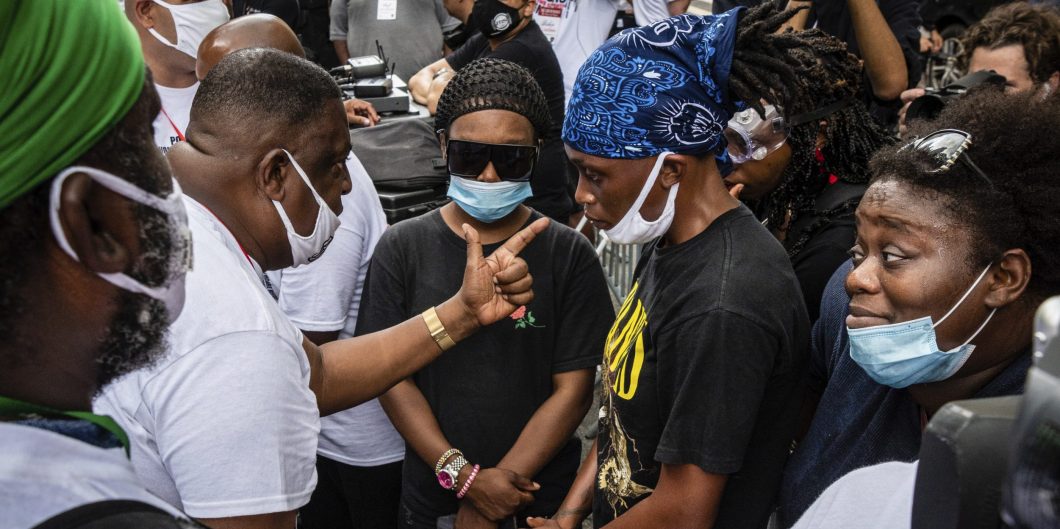The wisdom of Captain Bob Wallace saves Christmas, not only for the Haynes Sisters, but for General Waverly, the Columbia Inn, and the old Army unit.
Civility as Political Suicide
Elizabeth Corey doesn’t deliver on her title, “Civility in War-Time.” She suggests that civility can be practiced in war-time, but instead of explaining how, Corey shows how it would be awesome if we were not in war-time so we could be civil not just among friends and in our families, but with all of our fellow citizens. However, since we are in a deep civil conflict, we cannot practice civility in politics.
The problem with civility is not, as she says, that its voice is quiet and it is difficult to practice. The problem is that civility can lead to political suicide under certain conditions.
The American Left has, she begins, conducted a war on civility. This comes from critical theorists. Since all language is an imposition of power by a dominant elite, rules of civility and restraint in speech, critical theorists claim, just restrain the weak. Being nice means accepting the current power structures. The “weak” should therefore reject faux civility while embracing activism and the “absolute moral clarity it requires.” This point of view informs Leftists from Herbert Marcuse to Toni Morrison, Black Lives Matter, #MeToo, and beyond.
There is an additional problem. Liberals have corrupted civility. Civility now means conformity to liberalism’s dogmas, ever more elaborate and stringent. President Obama’s National Endowment for Humanities Director Jim Leach, pretending to lecture the country of civility back in the day, told Americans that “those who seek unity by respecting diversity” model civility, not those who “press debilitating cultural wars or extreme ideological agendas.” Thus any discussion of immigration restrictions (among many other things) is ipso facto uncivil.
While these threats to civil government and civility are afoot, many see the rise of incivility on the populist Right as a sign that things are going from bad to worse. The Left attacks civility in principle and liberals define conservatism as uncivil. The Right, which used to be better, reacts to its no-win situation and votes for the uncivil Trump. Without the possibility of being civil the Right ceases to care about civility. There is no moral high ground anymore! Some on the Right (including Corey?) hope to resurrect a civility that brings the high ground back. Can we find a more civil leader who will defend the nation and civility today?
What we have, however, is something unanticipated from the Left’s perspective. The uncivil Left is today strong and occupies the commanding heights of American society. The Right has the reputation for dominance but grows weaker by the day. The Left thinks of civility as the structure the dominant class creates to sustain its rule. Liberals sustain their rule indeed through defining the terms of debate. If the Left is correct, then Corey’s embrace of civility for conservatives is, from the Left’s perspective, fattening the calf for the kill. The strong Left could afford civility (but it does not practice it), but the weak conservatives cannot afford it if they hope to win.
A true political science must account for civility and for its limits. It is not simply that, as Corey writes, some issues are “so important” that citizens must “suspend the rules of civility” until someone wins. Those taken with the virtues of civility can misunderstand the demands and nature of politics. Civility works when there is broad agreement about the goals of politics and a functioning political community. Agreement on fundamentals allows people to work out differences. Civility has never been key to solving high-level political conflicts in America—fair-minded argument based on the public good is, as Hamilton writes in Federalist 1, “more ardently to be wished for, than seriously to be expected.”
In war-time, civility can be dispiriting. An untoward civility discourages people from seeing the likely dangers to social peace. Sometimes politics calls for anger or force, by Zeus!
How did we get to the point where the specter of revolutionary nihilism hangs over our once proud republic? Did the practice of civility, if such there was, stave off our culture wars or abet them? Can the practice of civility actually abet the revolution, critical theory, and activism, violent and otherwise?
The Leftist-inspired critical theorists and activists have used the civility that the formerly “dominant majority” practices against it. Taunting the Right into “civility” and remaining silent on fundamental issues has long been a tactic of the Left. Since they don’t value civility, they mustn’t be civil. “Make the enemy live up to its own book of rules,” as Saul Alinsky writes. Those rules include civility, fairness to the arguments of fellow citizens, scholarly detachment, the weighing of evidence and so on. The double-standard in civility befuddles the civil, while it emboldens the uncivil to attack and proceed with ever-grander ambitions.
Civility is nice in theory, but how does it work out in practice? Pick any from countless examples in recent politics and ask, “how could civility be applied to this situation?” Consider the Senate’s character assassination of now Justice Brett Kavanaugh. Activists and Senators trumped up charges that this respectable man committed rape years ago, that he gang-raped another woman and what not. Sleazy porn lawyers were trotted out on major media to amplify the charges. How did these accusations reach the light of day? Was this civility?
Hearings commenced. Arguments were marshalled. Diaries consulted. Testimony taken. Evidence weighed. The charges were “dignified” with a response. Was the Senate’s process civil?
When fellow citizens pull down statues, their motives reveal a commitment to destroying the old and gaining acquiescence in the building of a new civilization: civility on its own terms cannot provide an adequate political response in such circumstances.
Yet the unconvincable, trying to keep him off the court by any means necessary, were unconvinced. Was this civility? It showed that some are not interested in living together with their fellow citizens in peace and mutual forbearance. It proved that we are in war-like situation. Perhaps if Kavanaugh’s accusers had read the Nicomachean Ethics or Corey’s defense of civility they’d have changed. Perhaps you’d like to buy some ocean front property here in Idaho?
What public teaching followed in the wake of the hearings? The candidate and his Senate defenders were righteously angered. Was this “civil”? Fewer good people would want to come forward for this “civil” process. Many ordinary citizens and future candidates know that this could happen to them too (but they would lack the resources to fight back). The process afforded Brett Kavanaugh only a sham “civility.”
The 1619 Project is based on a mound of lies, easily confuted in a very civil way. Many, many, many esteemed historians and political theorists have done it. Has that response been adequate? Has that response been sufficient to warn our citizens of the nature of this attack on American civilization? Perhaps the direct but less civil response is the more truthful and more necessary politically.
We can argue, in our courtrooms and in journals, about affirmative action or reparations for descendants of slaves or police reform or abolition. All of these public questions are ultimately complicated—and they raise interesting fundamental questions for academics to contemplate. Shall we have that argument in legislatures or city councils while rioters burn the nation’s courthouses or occupy its highways and roads? Who loses and who wins in a one-sided sham civility, where charges of racism fly in one direction and ignored civil references to data and historical perspective are given in return?
A civil person deals with the arguments of fellow citizens, not their motives. We scholars and teachers do precisely that. That is a wonderful, philosophic disposition—one that I am happy to be trained into just as Corey is and one I hope I practice as well as she. We always want to give the benefit of the doubt to our theoretical opponents: civility demands that we teachers (and we Christians) put the best construction on everything.
But such civility can also promote a debilitating naivete. The best construction can be the wrong construction—it may give too much credit to one’s opponents and their intent. Motives matter a lot in politics. Civility can prevent people from seeing what is going on. When fellow citizens pull down statues, their motives reveal a commitment to destroying the old and gaining acquiescence in the building of a new civilization: civility on its own terms cannot provide an adequate political response in such circumstances. It is a virtue fit for small ball politics, not for civil wars, cold or hot.
Learning is for war-time as much as for peace (I assume Corey refers to that C.S. Lewis talk in her title). Civility is a philosophic and scholarly virtue. Still, there is a chasm between philosophy and the city. The place of civility in politics is much more circumscribed. It is pretty to think we are not at war. But if we are at war, then civility is worse than useless. It is unilateral disarmament. It is a lullaby that prevents us from seeing and acting as is necessary or that presumes that the conflicts are less fundamental than they are.
By all means, we ought to teach our kids checkers, have civil investigations in class and among friends, and pursue truth! Yet civility is not commensurate to today’s political threat. Too high an emphasis on civility and excessive worry about gaining a reputation for incivility is political suicide.



